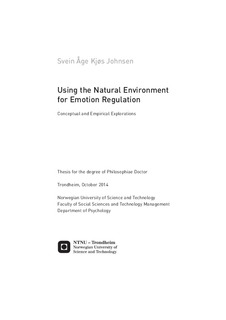Using the Natural Environment for Emotion Regulation Conceptual and Empirical Explorations
Doctoral thesis
Permanent lenke
http://hdl.handle.net/11250/271294Utgivelsesdato
2014Metadata
Vis full innførselSamlinger
- Institutt for psykologi [3085]
Sammendrag
The topic of this thesis is the use of natural environments for regulating emotions. This is investigated through a theoretical analysis, a field study, an experimental study, and a survey study. In the theoretical analysis, it is argued that the environment can have both a direct and an indirect effect on emotions. For example, the environment could make it easier to process emotions. Furthermore, people may benefit differently from nature; some may benefit more from increase in positive emotions, some may benefit more from the restoration of cognitive resources, whereas others may benefit from decreases in negative emotions. In the field study, an attempt was made to measure the use of nature for emotion regulation and to explore relations between such usage and personality, stress and a number of restorative outcomes. Three aspects of emotion regulation in nature were found: positive emotion regulation, negative emotion regulation, and the increase of negative emotion while not in nature. Furthermore, a novel restorative outcome concept, termed ego restoration, was introduced, and it was attempted to measure this concept by operationally defining it as perceived changes in “willpower”. The main conclusion was that people who use nature for emotion regulation also report cognitive benefits from being in nature. The experimental study showed that actively using a picture of nature for emotion regulation can have a beneficial impact on positive mood (although the results indicated that this effect may be complex). The survey study showed that the motivational tendency to visit a natural environment when happy was associated with positive mood, albeit weakly. People generally perceive nature as having the potential to reduce negative and increase positive feelings. Nature appears to possess a number of special properties beyond the capacities of simple activation of positive emotion, and reduction of negative emotion. The evidence reported in this thesis indicates that the use of nature for emotion regulation generally divides into 1) the regulation of negative emotion, which is associated with self-reported restoration and a perceived increase in self-control strength, and 2) the regulation of positive emotion, which is also associated with restoration.
Består av
Johnsen, Svein Åge Kjøs. The use of nature for emotion regulation. Ecopsychology. (ISSN 1942-9347). 3(3): 175-185, 2011. 10.1089/eco.2011.0006.Johnsen, Svein Age Kjos. Exploring the use of nature for emotion regulation. Nordic Psychology. (ISSN 1901-2276). 65(4): 306-321, 2013. 10.1080/19012276.2013.851445.
Johnsen, Svein Åge Kjøs; Rydstedt, Leif. Active Use of the Natural Environment for Emotion Regulation. Europe's Journal of Psychology. (ISSN 1841-0413). 9(4): 798-819, 2013. 10.5964/ejop.v9i4.633.
